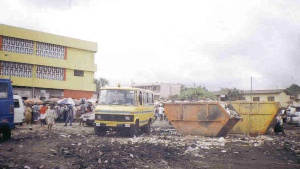The Filth On Accra Streets-Here?s How To Solve It

Pictures: Photo Report
Is it not a shame that our streets should be so filthy? Even what you see at midday on a busy weekday is nothing compared with what you see when you drive through Accra on a quiet Sunday morning. Plastic bags float through the air like giant multicoloured manna falling from heaven. The streets below are littered with all kinds of refuse and sadly the few early risers pick their way gingerly through all this, oblivious to the state of their surroundings.
What is the cause of this filth? How can we solve the problem? This article will seek to answer these two questions, which are the most crucial among the many that can be raised on the subject, as objectively as possible.
Why are our streets so filthy?
The general answer to this question is simple; the rate at which rubbish is dumped on the street is far in excess of the rate at which rubbish is taken off.
Rubbish accumulates on our streets because
- People chuck refuse indiscriminately about. For once let?s not blame them because we can?t change people. We?ll concentrate on what we can.
- There are insufficient bins in the city of Accra.
- When available these bins are insufficient, wrongly designed and not user-friendly. They are either already overflowing with rubbish or covered in such a manner as to make their use unattractive to members of the public. Imagine being smartly dressed for work or interview. You stop to refresh yourself with ice water for example. Will you like to lift the lid of a filthy rubbish pan to put in your refuse? Most people wouldn?t.
- Rubbish bins are either not emptied or emptied so infrequently that their effect is not felt.
- Our roads and public places are either never swept or swept so infrequently as to make no difference to the aesthetics of the place. Most lorry parks are swept only after the close of day or early the next morning. This is woefully inadequate.
- When roads are swept, emphasis is placed in the wrong places. I have often seen uniformed sweepers busily trying to clear a thin film of ubiquitous dust from the inner streets of the Kwame Nkrumah Circle but I have never seen anybody sweeping the grounds of the Circle-to-Kaneshie station, only a few hundred metres away.
- Our commercial vehicles do not have provisions for collecting rubbish. The ?mates? do not like to collect other people?s rubbish. When they do collect the rubbish they simply dump it unto the yard in the car park, thus adding to the filth.
How can the problem be solved?
As they say, once a cause is identified, the solution should be nearby. If you consider that the problem is caused by the rate of deposition of rubbish being far in excess of the rate of removal, then the solution is simply to increase the rate at which the rubbish is taken off. The recommendations below must be concentrated in the high traffic areas like Okaishie, Kaneshie, Odorkor and Kantamanto. There?s no use sweeping clean streets. This is what must be done;
Roads and public places such as lorry parks must be swept throughout the day, not only in the evenings. Sweepers must go out and sweep every 3 hours. If this is done, it will give greater justification for punishing offenders. It will also provide employment for the unemployed. Dust bins must be provided abundantly in the high traffic areas mentioned. One every 3 to 5 metres should be fine. The dustbins must be properly designed and protected from theft and vandalism as in the picture shown, not simply movable covered plastic containers. They should be covered yet provide for the public to deposit rubbish without having to touch them. Dust bins must be emptied at regular intervals during the day, not just only at the close of the working day. Four to five times a day will be very adequate.
Road sweepers and garbage collectors must be respectably paid and catered for to make the job attractive. Already, people consider the job to be the most menial. We should compensate with cash. This can be financed from the daily tolls at stations. I have always wondered what those transport unions do with all the money they collect. Supervisors must inspect their areas of responsibility as regularly as their cleaners are supposed to work to ensure work is done. Any substandard work must be immediately addressed. All bus tops must have 2 of these dustbins. Again these dustbins must be emptied and the surroundings swept regularly throughout the day So you see the solution to our problem is not a matter of high-tech gadgetry, but of simple application and effort. The streets of the great cities we admire and hear about have been clean for centuries, long before automotive vehicles were invented. Similarly simple measures can be used to solve the problem of the gutters, sanitation etc., but that is a subject for another piece.
 Views expressed by the author(s) do not necessarily reflect those of GhanaHomePage.
Views expressed by the author(s) do not necessarily reflect those of GhanaHomePage.